Information and Knowledge Management in Supply Chain
VerifiedAdded on 2022/11/25
|16
|4329
|121
AI Summary
This essay discusses the need for information and knowledge management in supply chain and identifies the benefits and barriers of information sharing. It also reviews relevant literature on the topic.
Contribute Materials
Your contribution can guide someone’s learning journey. Share your
documents today.
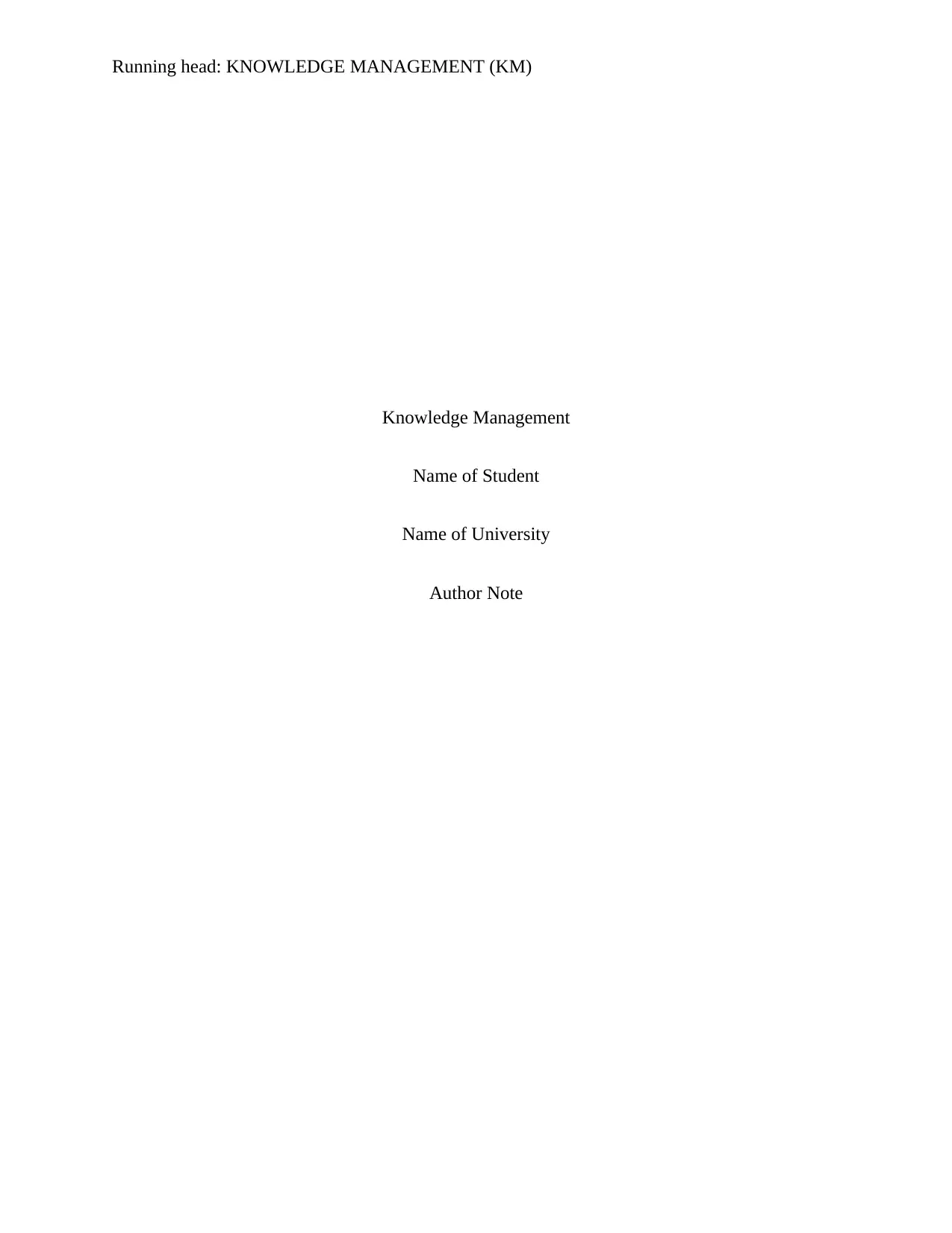
Running head: KNOWLEDGE MANAGEMENT (KM)
Knowledge Management
Name of Student
Name of University
Author Note
Knowledge Management
Name of Student
Name of University
Author Note
Secure Best Marks with AI Grader
Need help grading? Try our AI Grader for instant feedback on your assignments.
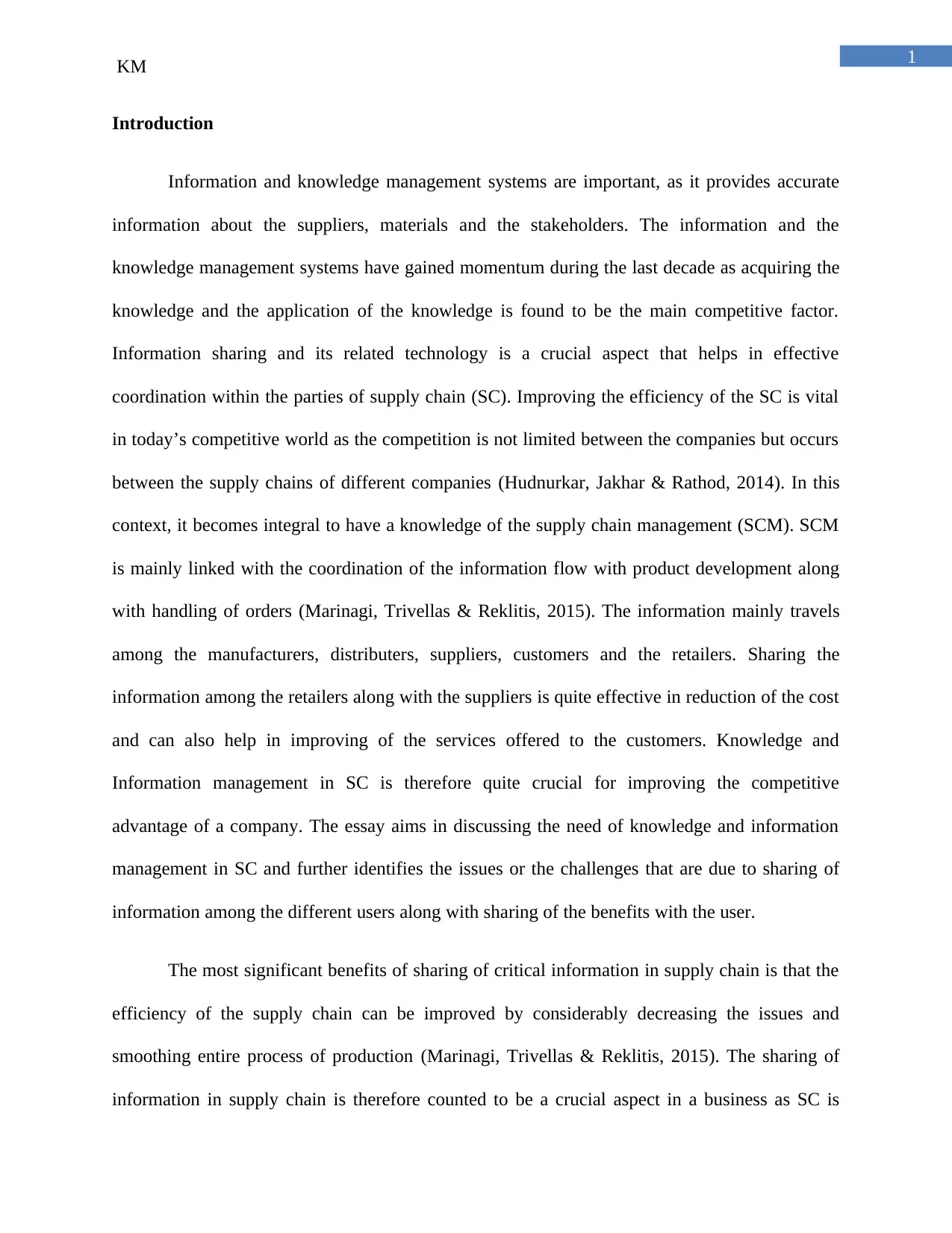
1
KM
Introduction
Information and knowledge management systems are important, as it provides accurate
information about the suppliers, materials and the stakeholders. The information and the
knowledge management systems have gained momentum during the last decade as acquiring the
knowledge and the application of the knowledge is found to be the main competitive factor.
Information sharing and its related technology is a crucial aspect that helps in effective
coordination within the parties of supply chain (SC). Improving the efficiency of the SC is vital
in today’s competitive world as the competition is not limited between the companies but occurs
between the supply chains of different companies (Hudnurkar, Jakhar & Rathod, 2014). In this
context, it becomes integral to have a knowledge of the supply chain management (SCM). SCM
is mainly linked with the coordination of the information flow with product development along
with handling of orders (Marinagi, Trivellas & Reklitis, 2015). The information mainly travels
among the manufacturers, distributers, suppliers, customers and the retailers. Sharing the
information among the retailers along with the suppliers is quite effective in reduction of the cost
and can also help in improving of the services offered to the customers. Knowledge and
Information management in SC is therefore quite crucial for improving the competitive
advantage of a company. The essay aims in discussing the need of knowledge and information
management in SC and further identifies the issues or the challenges that are due to sharing of
information among the different users along with sharing of the benefits with the user.
The most significant benefits of sharing of critical information in supply chain is that the
efficiency of the supply chain can be improved by considerably decreasing the issues and
smoothing entire process of production (Marinagi, Trivellas & Reklitis, 2015). The sharing of
information in supply chain is therefore counted to be a crucial aspect in a business as SC is
KM
Introduction
Information and knowledge management systems are important, as it provides accurate
information about the suppliers, materials and the stakeholders. The information and the
knowledge management systems have gained momentum during the last decade as acquiring the
knowledge and the application of the knowledge is found to be the main competitive factor.
Information sharing and its related technology is a crucial aspect that helps in effective
coordination within the parties of supply chain (SC). Improving the efficiency of the SC is vital
in today’s competitive world as the competition is not limited between the companies but occurs
between the supply chains of different companies (Hudnurkar, Jakhar & Rathod, 2014). In this
context, it becomes integral to have a knowledge of the supply chain management (SCM). SCM
is mainly linked with the coordination of the information flow with product development along
with handling of orders (Marinagi, Trivellas & Reklitis, 2015). The information mainly travels
among the manufacturers, distributers, suppliers, customers and the retailers. Sharing the
information among the retailers along with the suppliers is quite effective in reduction of the cost
and can also help in improving of the services offered to the customers. Knowledge and
Information management in SC is therefore quite crucial for improving the competitive
advantage of a company. The essay aims in discussing the need of knowledge and information
management in SC and further identifies the issues or the challenges that are due to sharing of
information among the different users along with sharing of the benefits with the user.
The most significant benefits of sharing of critical information in supply chain is that the
efficiency of the supply chain can be improved by considerably decreasing the issues and
smoothing entire process of production (Marinagi, Trivellas & Reklitis, 2015). The sharing of
information in supply chain is therefore counted to be a crucial aspect in a business as SC is
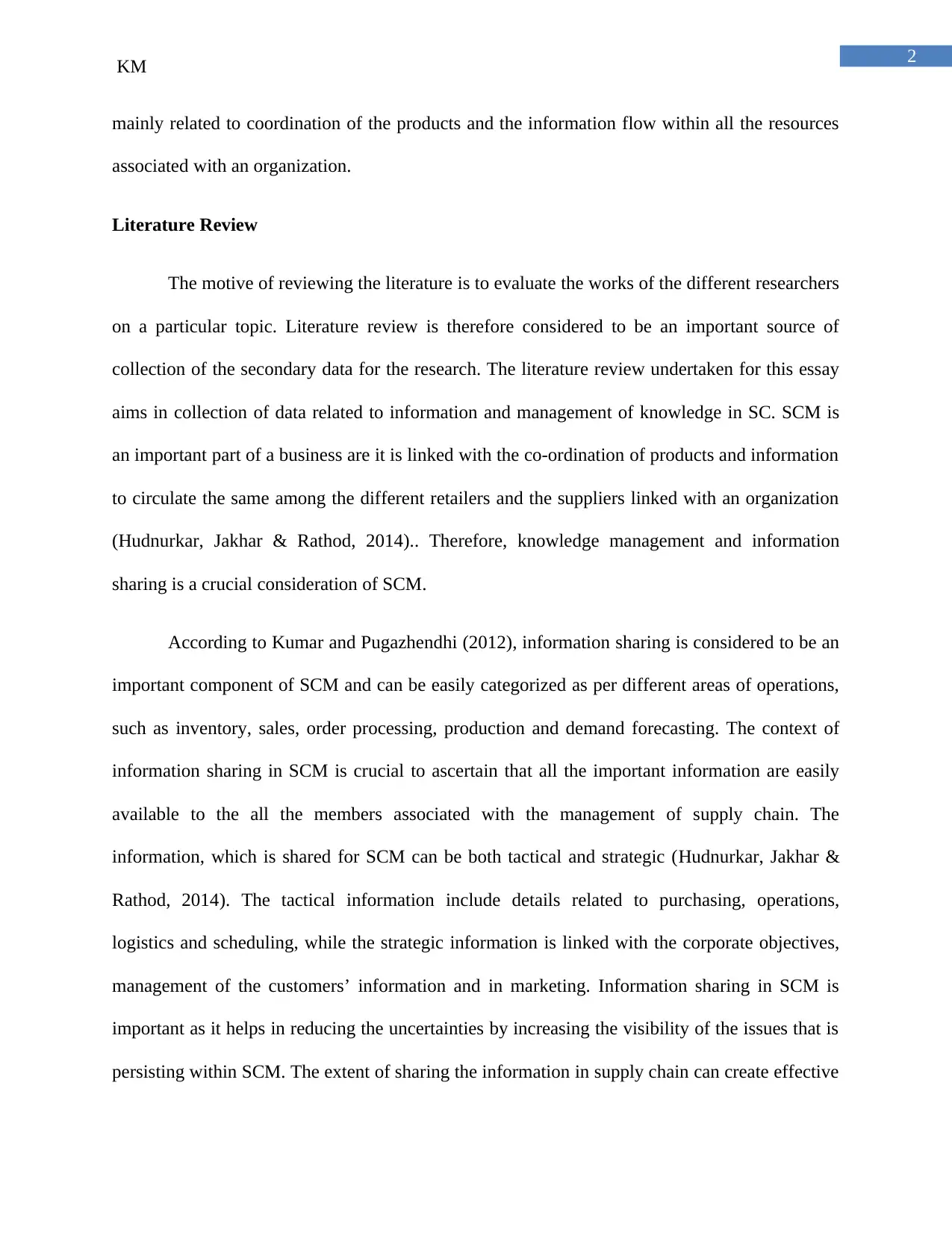
2
KM
mainly related to coordination of the products and the information flow within all the resources
associated with an organization.
Literature Review
The motive of reviewing the literature is to evaluate the works of the different researchers
on a particular topic. Literature review is therefore considered to be an important source of
collection of the secondary data for the research. The literature review undertaken for this essay
aims in collection of data related to information and management of knowledge in SC. SCM is
an important part of a business are it is linked with the co-ordination of products and information
to circulate the same among the different retailers and the suppliers linked with an organization
(Hudnurkar, Jakhar & Rathod, 2014).. Therefore, knowledge management and information
sharing is a crucial consideration of SCM.
According to Kumar and Pugazhendhi (2012), information sharing is considered to be an
important component of SCM and can be easily categorized as per different areas of operations,
such as inventory, sales, order processing, production and demand forecasting. The context of
information sharing in SCM is crucial to ascertain that all the important information are easily
available to the all the members associated with the management of supply chain. The
information, which is shared for SCM can be both tactical and strategic (Hudnurkar, Jakhar &
Rathod, 2014). The tactical information include details related to purchasing, operations,
logistics and scheduling, while the strategic information is linked with the corporate objectives,
management of the customers’ information and in marketing. Information sharing in SCM is
important as it helps in reducing the uncertainties by increasing the visibility of the issues that is
persisting within SCM. The extent of sharing the information in supply chain can create effective
KM
mainly related to coordination of the products and the information flow within all the resources
associated with an organization.
Literature Review
The motive of reviewing the literature is to evaluate the works of the different researchers
on a particular topic. Literature review is therefore considered to be an important source of
collection of the secondary data for the research. The literature review undertaken for this essay
aims in collection of data related to information and management of knowledge in SC. SCM is
an important part of a business are it is linked with the co-ordination of products and information
to circulate the same among the different retailers and the suppliers linked with an organization
(Hudnurkar, Jakhar & Rathod, 2014).. Therefore, knowledge management and information
sharing is a crucial consideration of SCM.
According to Kumar and Pugazhendhi (2012), information sharing is considered to be an
important component of SCM and can be easily categorized as per different areas of operations,
such as inventory, sales, order processing, production and demand forecasting. The context of
information sharing in SCM is crucial to ascertain that all the important information are easily
available to the all the members associated with the management of supply chain. The
information, which is shared for SCM can be both tactical and strategic (Hudnurkar, Jakhar &
Rathod, 2014). The tactical information include details related to purchasing, operations,
logistics and scheduling, while the strategic information is linked with the corporate objectives,
management of the customers’ information and in marketing. Information sharing in SCM is
important as it helps in reducing the uncertainties by increasing the visibility of the issues that is
persisting within SCM. The extent of sharing the information in supply chain can create effective
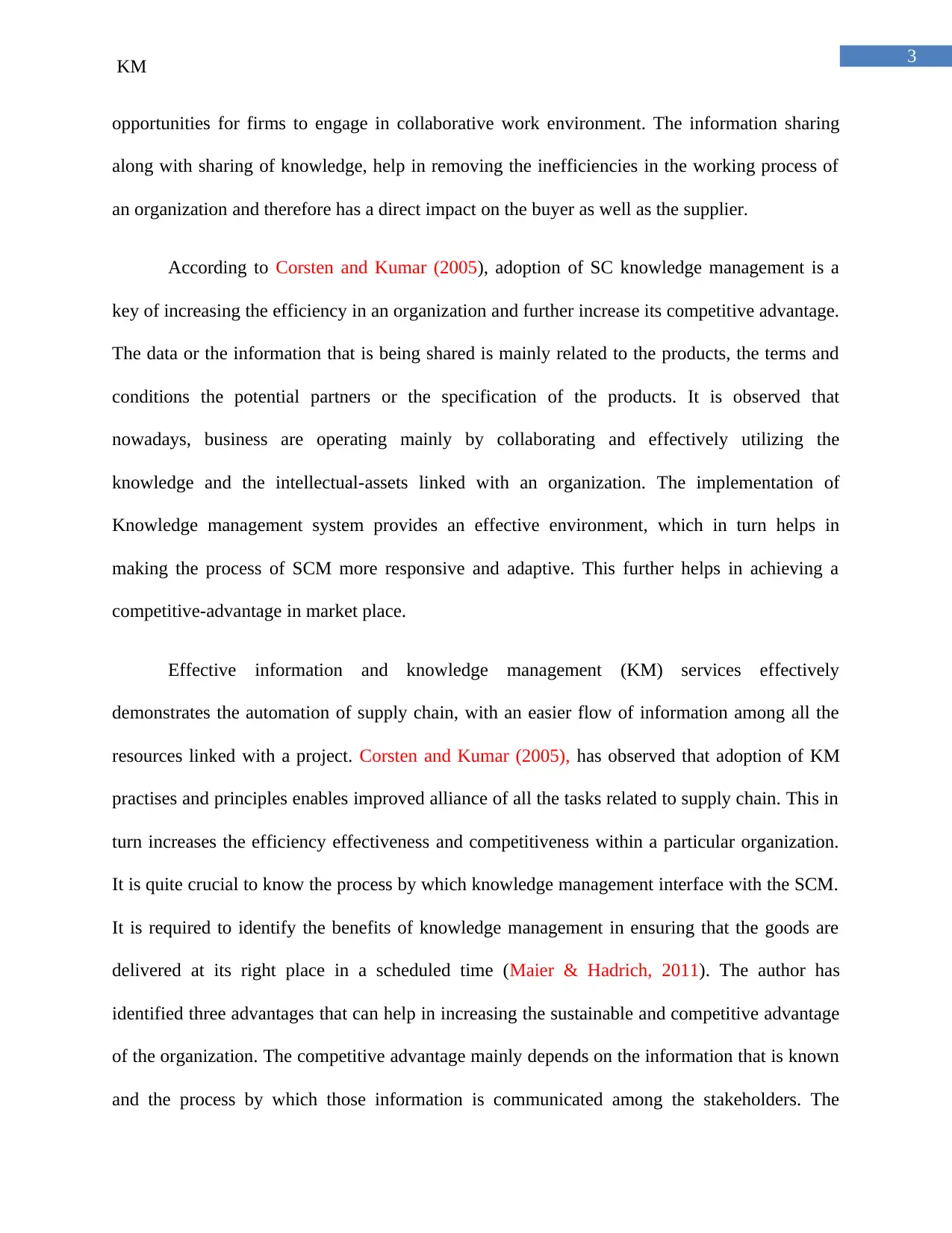
3
KM
opportunities for firms to engage in collaborative work environment. The information sharing
along with sharing of knowledge, help in removing the inefficiencies in the working process of
an organization and therefore has a direct impact on the buyer as well as the supplier.
According to Corsten and Kumar (2005), adoption of SC knowledge management is a
key of increasing the efficiency in an organization and further increase its competitive advantage.
The data or the information that is being shared is mainly related to the products, the terms and
conditions the potential partners or the specification of the products. It is observed that
nowadays, business are operating mainly by collaborating and effectively utilizing the
knowledge and the intellectual-assets linked with an organization. The implementation of
Knowledge management system provides an effective environment, which in turn helps in
making the process of SCM more responsive and adaptive. This further helps in achieving a
competitive-advantage in market place.
Effective information and knowledge management (KM) services effectively
demonstrates the automation of supply chain, with an easier flow of information among all the
resources linked with a project. Corsten and Kumar (2005), has observed that adoption of KM
practises and principles enables improved alliance of all the tasks related to supply chain. This in
turn increases the efficiency effectiveness and competitiveness within a particular organization.
It is quite crucial to know the process by which knowledge management interface with the SCM.
It is required to identify the benefits of knowledge management in ensuring that the goods are
delivered at its right place in a scheduled time (Maier & Hadrich, 2011). The author has
identified three advantages that can help in increasing the sustainable and competitive advantage
of the organization. The competitive advantage mainly depends on the information that is known
and the process by which those information is communicated among the stakeholders. The
KM
opportunities for firms to engage in collaborative work environment. The information sharing
along with sharing of knowledge, help in removing the inefficiencies in the working process of
an organization and therefore has a direct impact on the buyer as well as the supplier.
According to Corsten and Kumar (2005), adoption of SC knowledge management is a
key of increasing the efficiency in an organization and further increase its competitive advantage.
The data or the information that is being shared is mainly related to the products, the terms and
conditions the potential partners or the specification of the products. It is observed that
nowadays, business are operating mainly by collaborating and effectively utilizing the
knowledge and the intellectual-assets linked with an organization. The implementation of
Knowledge management system provides an effective environment, which in turn helps in
making the process of SCM more responsive and adaptive. This further helps in achieving a
competitive-advantage in market place.
Effective information and knowledge management (KM) services effectively
demonstrates the automation of supply chain, with an easier flow of information among all the
resources linked with a project. Corsten and Kumar (2005), has observed that adoption of KM
practises and principles enables improved alliance of all the tasks related to supply chain. This in
turn increases the efficiency effectiveness and competitiveness within a particular organization.
It is quite crucial to know the process by which knowledge management interface with the SCM.
It is required to identify the benefits of knowledge management in ensuring that the goods are
delivered at its right place in a scheduled time (Maier & Hadrich, 2011). The author has
identified three advantages that can help in increasing the sustainable and competitive advantage
of the organization. The competitive advantage mainly depends on the information that is known
and the process by which those information is communicated among the stakeholders. The
Secure Best Marks with AI Grader
Need help grading? Try our AI Grader for instant feedback on your assignments.
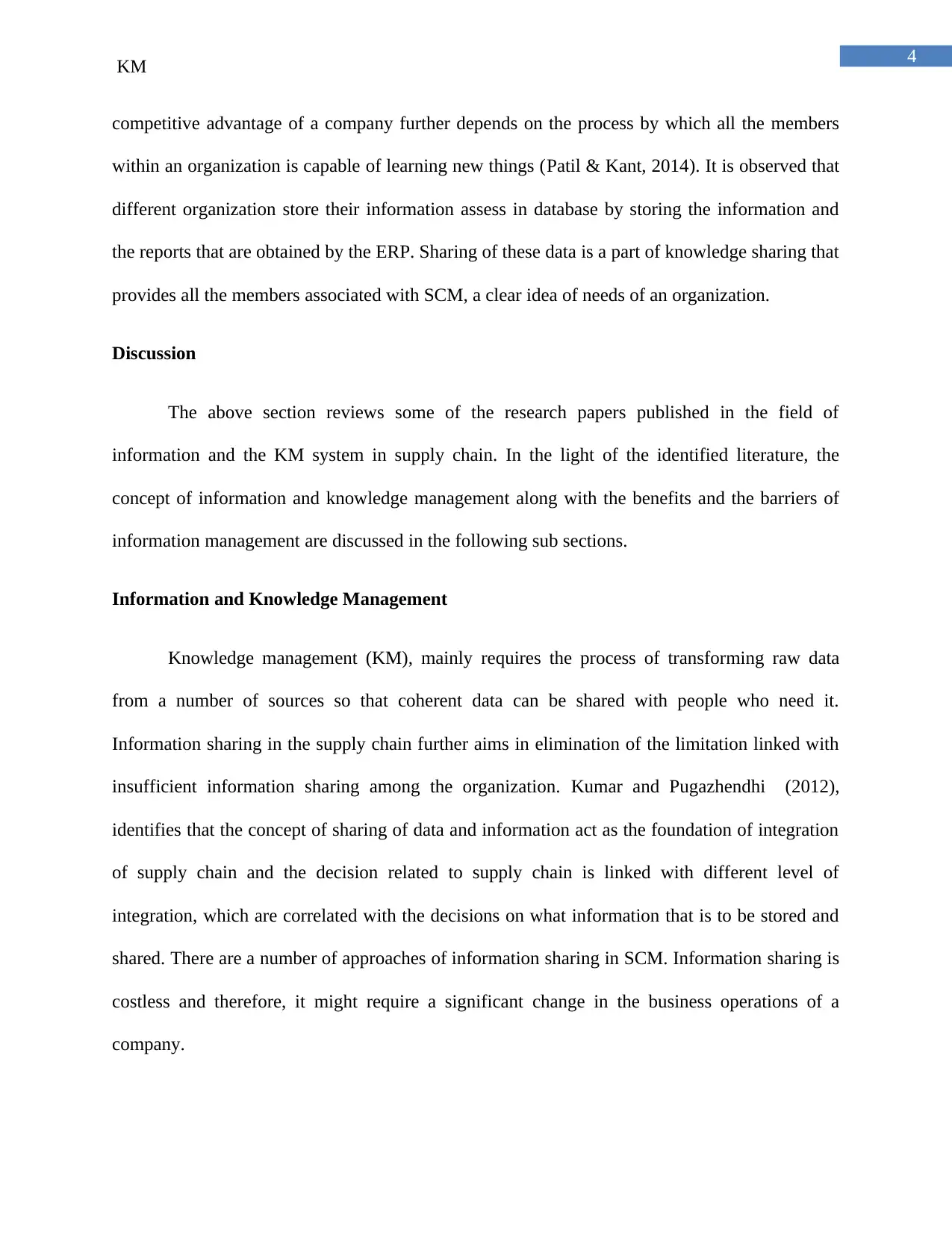
4
KM
competitive advantage of a company further depends on the process by which all the members
within an organization is capable of learning new things (Patil & Kant, 2014). It is observed that
different organization store their information assess in database by storing the information and
the reports that are obtained by the ERP. Sharing of these data is a part of knowledge sharing that
provides all the members associated with SCM, a clear idea of needs of an organization.
Discussion
The above section reviews some of the research papers published in the field of
information and the KM system in supply chain. In the light of the identified literature, the
concept of information and knowledge management along with the benefits and the barriers of
information management are discussed in the following sub sections.
Information and Knowledge Management
Knowledge management (KM), mainly requires the process of transforming raw data
from a number of sources so that coherent data can be shared with people who need it.
Information sharing in the supply chain further aims in elimination of the limitation linked with
insufficient information sharing among the organization. Kumar and Pugazhendhi (2012),
identifies that the concept of sharing of data and information act as the foundation of integration
of supply chain and the decision related to supply chain is linked with different level of
integration, which are correlated with the decisions on what information that is to be stored and
shared. There are a number of approaches of information sharing in SCM. Information sharing is
costless and therefore, it might require a significant change in the business operations of a
company.
KM
competitive advantage of a company further depends on the process by which all the members
within an organization is capable of learning new things (Patil & Kant, 2014). It is observed that
different organization store their information assess in database by storing the information and
the reports that are obtained by the ERP. Sharing of these data is a part of knowledge sharing that
provides all the members associated with SCM, a clear idea of needs of an organization.
Discussion
The above section reviews some of the research papers published in the field of
information and the KM system in supply chain. In the light of the identified literature, the
concept of information and knowledge management along with the benefits and the barriers of
information management are discussed in the following sub sections.
Information and Knowledge Management
Knowledge management (KM), mainly requires the process of transforming raw data
from a number of sources so that coherent data can be shared with people who need it.
Information sharing in the supply chain further aims in elimination of the limitation linked with
insufficient information sharing among the organization. Kumar and Pugazhendhi (2012),
identifies that the concept of sharing of data and information act as the foundation of integration
of supply chain and the decision related to supply chain is linked with different level of
integration, which are correlated with the decisions on what information that is to be stored and
shared. There are a number of approaches of information sharing in SCM. Information sharing is
costless and therefore, it might require a significant change in the business operations of a
company.
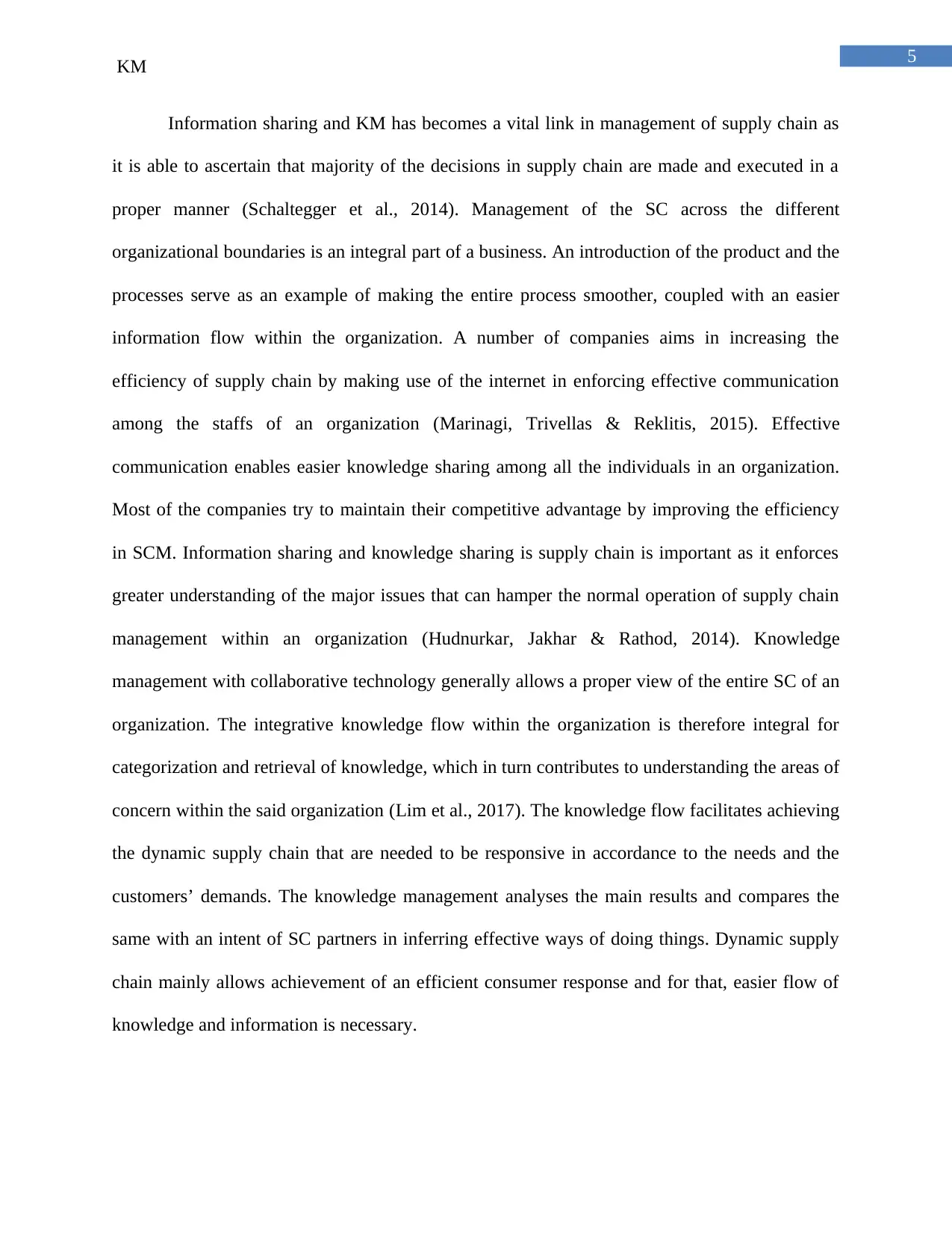
5
KM
Information sharing and KM has becomes a vital link in management of supply chain as
it is able to ascertain that majority of the decisions in supply chain are made and executed in a
proper manner (Schaltegger et al., 2014). Management of the SC across the different
organizational boundaries is an integral part of a business. An introduction of the product and the
processes serve as an example of making the entire process smoother, coupled with an easier
information flow within the organization. A number of companies aims in increasing the
efficiency of supply chain by making use of the internet in enforcing effective communication
among the staffs of an organization (Marinagi, Trivellas & Reklitis, 2015). Effective
communication enables easier knowledge sharing among all the individuals in an organization.
Most of the companies try to maintain their competitive advantage by improving the efficiency
in SCM. Information sharing and knowledge sharing is supply chain is important as it enforces
greater understanding of the major issues that can hamper the normal operation of supply chain
management within an organization (Hudnurkar, Jakhar & Rathod, 2014). Knowledge
management with collaborative technology generally allows a proper view of the entire SC of an
organization. The integrative knowledge flow within the organization is therefore integral for
categorization and retrieval of knowledge, which in turn contributes to understanding the areas of
concern within the said organization (Lim et al., 2017). The knowledge flow facilitates achieving
the dynamic supply chain that are needed to be responsive in accordance to the needs and the
customers’ demands. The knowledge management analyses the main results and compares the
same with an intent of SC partners in inferring effective ways of doing things. Dynamic supply
chain mainly allows achievement of an efficient consumer response and for that, easier flow of
knowledge and information is necessary.
KM
Information sharing and KM has becomes a vital link in management of supply chain as
it is able to ascertain that majority of the decisions in supply chain are made and executed in a
proper manner (Schaltegger et al., 2014). Management of the SC across the different
organizational boundaries is an integral part of a business. An introduction of the product and the
processes serve as an example of making the entire process smoother, coupled with an easier
information flow within the organization. A number of companies aims in increasing the
efficiency of supply chain by making use of the internet in enforcing effective communication
among the staffs of an organization (Marinagi, Trivellas & Reklitis, 2015). Effective
communication enables easier knowledge sharing among all the individuals in an organization.
Most of the companies try to maintain their competitive advantage by improving the efficiency
in SCM. Information sharing and knowledge sharing is supply chain is important as it enforces
greater understanding of the major issues that can hamper the normal operation of supply chain
management within an organization (Hudnurkar, Jakhar & Rathod, 2014). Knowledge
management with collaborative technology generally allows a proper view of the entire SC of an
organization. The integrative knowledge flow within the organization is therefore integral for
categorization and retrieval of knowledge, which in turn contributes to understanding the areas of
concern within the said organization (Lim et al., 2017). The knowledge flow facilitates achieving
the dynamic supply chain that are needed to be responsive in accordance to the needs and the
customers’ demands. The knowledge management analyses the main results and compares the
same with an intent of SC partners in inferring effective ways of doing things. Dynamic supply
chain mainly allows achievement of an efficient consumer response and for that, easier flow of
knowledge and information is necessary.
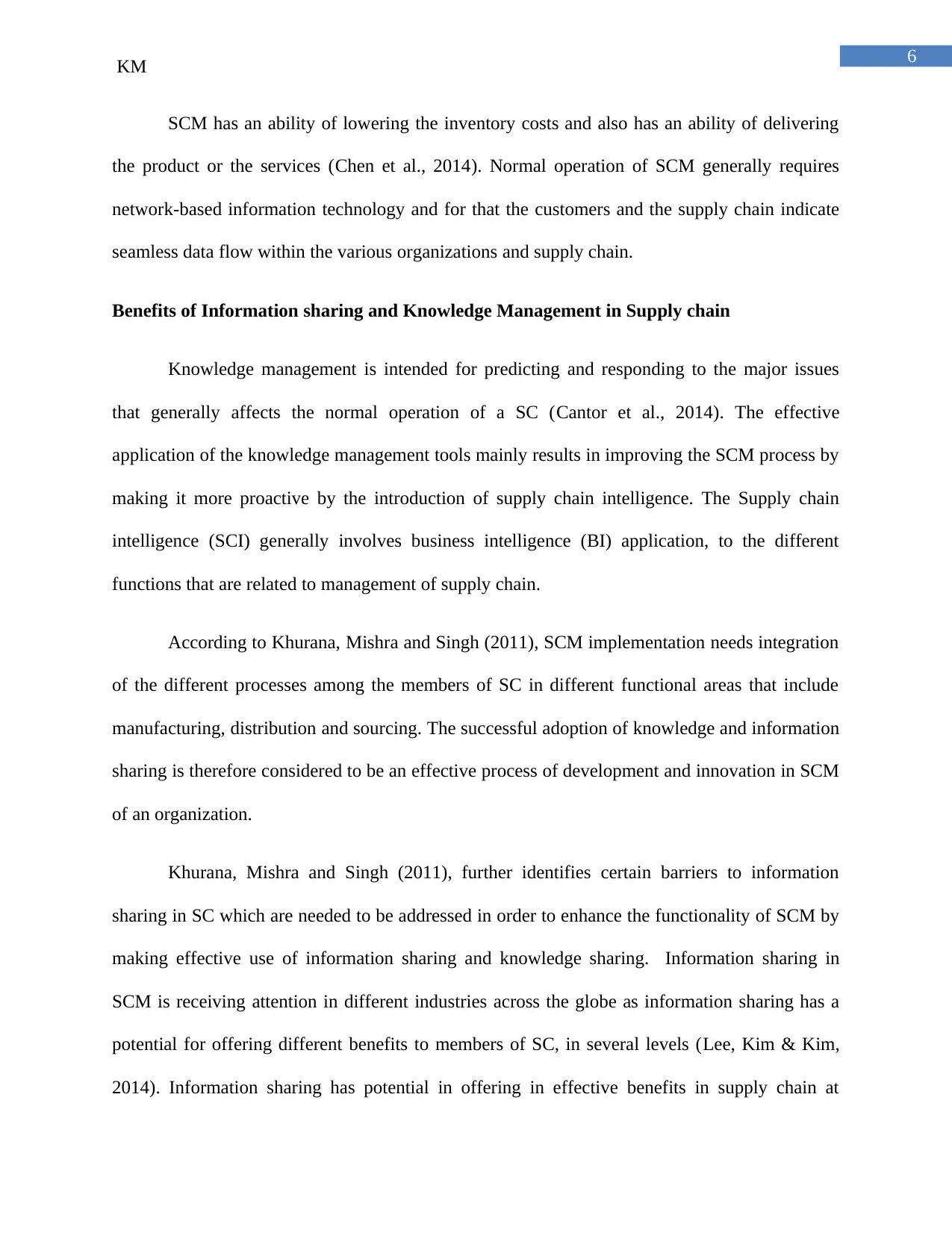
6
KM
SCM has an ability of lowering the inventory costs and also has an ability of delivering
the product or the services (Chen et al., 2014). Normal operation of SCM generally requires
network-based information technology and for that the customers and the supply chain indicate
seamless data flow within the various organizations and supply chain.
Benefits of Information sharing and Knowledge Management in Supply chain
Knowledge management is intended for predicting and responding to the major issues
that generally affects the normal operation of a SC (Cantor et al., 2014). The effective
application of the knowledge management tools mainly results in improving the SCM process by
making it more proactive by the introduction of supply chain intelligence. The Supply chain
intelligence (SCI) generally involves business intelligence (BI) application, to the different
functions that are related to management of supply chain.
According to Khurana, Mishra and Singh (2011), SCM implementation needs integration
of the different processes among the members of SC in different functional areas that include
manufacturing, distribution and sourcing. The successful adoption of knowledge and information
sharing is therefore considered to be an effective process of development and innovation in SCM
of an organization.
Khurana, Mishra and Singh (2011), further identifies certain barriers to information
sharing in SC which are needed to be addressed in order to enhance the functionality of SCM by
making effective use of information sharing and knowledge sharing. Information sharing in
SCM is receiving attention in different industries across the globe as information sharing has a
potential for offering different benefits to members of SC, in several levels (Lee, Kim & Kim,
2014). Information sharing has potential in offering in effective benefits in supply chain at
KM
SCM has an ability of lowering the inventory costs and also has an ability of delivering
the product or the services (Chen et al., 2014). Normal operation of SCM generally requires
network-based information technology and for that the customers and the supply chain indicate
seamless data flow within the various organizations and supply chain.
Benefits of Information sharing and Knowledge Management in Supply chain
Knowledge management is intended for predicting and responding to the major issues
that generally affects the normal operation of a SC (Cantor et al., 2014). The effective
application of the knowledge management tools mainly results in improving the SCM process by
making it more proactive by the introduction of supply chain intelligence. The Supply chain
intelligence (SCI) generally involves business intelligence (BI) application, to the different
functions that are related to management of supply chain.
According to Khurana, Mishra and Singh (2011), SCM implementation needs integration
of the different processes among the members of SC in different functional areas that include
manufacturing, distribution and sourcing. The successful adoption of knowledge and information
sharing is therefore considered to be an effective process of development and innovation in SCM
of an organization.
Khurana, Mishra and Singh (2011), further identifies certain barriers to information
sharing in SC which are needed to be addressed in order to enhance the functionality of SCM by
making effective use of information sharing and knowledge sharing. Information sharing in
SCM is receiving attention in different industries across the globe as information sharing has a
potential for offering different benefits to members of SC, in several levels (Lee, Kim & Kim,
2014). Information sharing has potential in offering in effective benefits in supply chain at
Paraphrase This Document
Need a fresh take? Get an instant paraphrase of this document with our AI Paraphraser
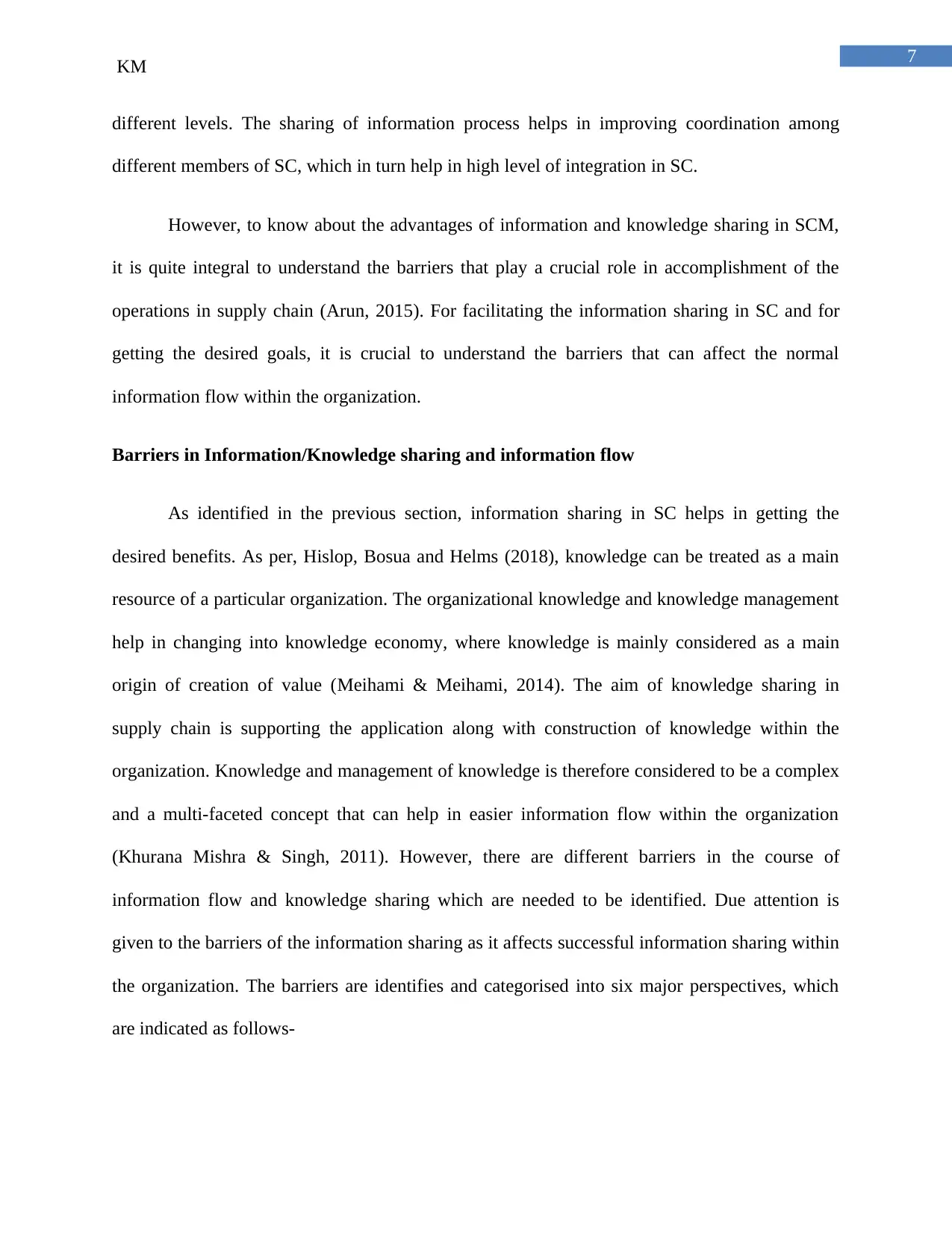
7
KM
different levels. The sharing of information process helps in improving coordination among
different members of SC, which in turn help in high level of integration in SC.
However, to know about the advantages of information and knowledge sharing in SCM,
it is quite integral to understand the barriers that play a crucial role in accomplishment of the
operations in supply chain (Arun, 2015). For facilitating the information sharing in SC and for
getting the desired goals, it is crucial to understand the barriers that can affect the normal
information flow within the organization.
Barriers in Information/Knowledge sharing and information flow
As identified in the previous section, information sharing in SC helps in getting the
desired benefits. As per, Hislop, Bosua and Helms (2018), knowledge can be treated as a main
resource of a particular organization. The organizational knowledge and knowledge management
help in changing into knowledge economy, where knowledge is mainly considered as a main
origin of creation of value (Meihami & Meihami, 2014). The aim of knowledge sharing in
supply chain is supporting the application along with construction of knowledge within the
organization. Knowledge and management of knowledge is therefore considered to be a complex
and a multi-faceted concept that can help in easier information flow within the organization
(Khurana Mishra & Singh, 2011). However, there are different barriers in the course of
information flow and knowledge sharing which are needed to be identified. Due attention is
given to the barriers of the information sharing as it affects successful information sharing within
the organization. The barriers are identifies and categorised into six major perspectives, which
are indicated as follows-
KM
different levels. The sharing of information process helps in improving coordination among
different members of SC, which in turn help in high level of integration in SC.
However, to know about the advantages of information and knowledge sharing in SCM,
it is quite integral to understand the barriers that play a crucial role in accomplishment of the
operations in supply chain (Arun, 2015). For facilitating the information sharing in SC and for
getting the desired goals, it is crucial to understand the barriers that can affect the normal
information flow within the organization.
Barriers in Information/Knowledge sharing and information flow
As identified in the previous section, information sharing in SC helps in getting the
desired benefits. As per, Hislop, Bosua and Helms (2018), knowledge can be treated as a main
resource of a particular organization. The organizational knowledge and knowledge management
help in changing into knowledge economy, where knowledge is mainly considered as a main
origin of creation of value (Meihami & Meihami, 2014). The aim of knowledge sharing in
supply chain is supporting the application along with construction of knowledge within the
organization. Knowledge and management of knowledge is therefore considered to be a complex
and a multi-faceted concept that can help in easier information flow within the organization
(Khurana Mishra & Singh, 2011). However, there are different barriers in the course of
information flow and knowledge sharing which are needed to be identified. Due attention is
given to the barriers of the information sharing as it affects successful information sharing within
the organization. The barriers are identifies and categorised into six major perspectives, which
are indicated as follows-
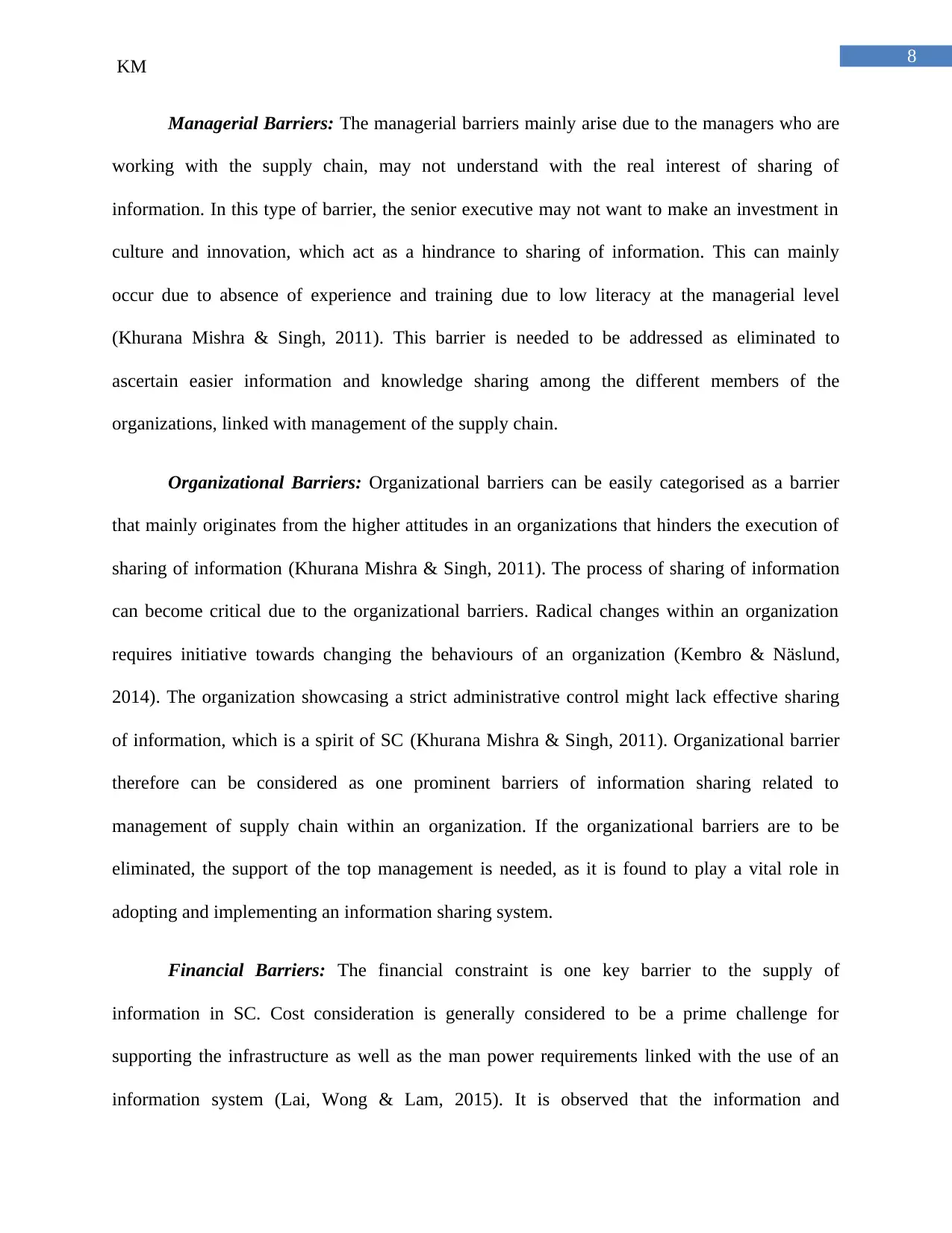
8
KM
Managerial Barriers: The managerial barriers mainly arise due to the managers who are
working with the supply chain, may not understand with the real interest of sharing of
information. In this type of barrier, the senior executive may not want to make an investment in
culture and innovation, which act as a hindrance to sharing of information. This can mainly
occur due to absence of experience and training due to low literacy at the managerial level
(Khurana Mishra & Singh, 2011). This barrier is needed to be addressed as eliminated to
ascertain easier information and knowledge sharing among the different members of the
organizations, linked with management of the supply chain.
Organizational Barriers: Organizational barriers can be easily categorised as a barrier
that mainly originates from the higher attitudes in an organizations that hinders the execution of
sharing of information (Khurana Mishra & Singh, 2011). The process of sharing of information
can become critical due to the organizational barriers. Radical changes within an organization
requires initiative towards changing the behaviours of an organization (Kembro & Näslund,
2014). The organization showcasing a strict administrative control might lack effective sharing
of information, which is a spirit of SC (Khurana Mishra & Singh, 2011). Organizational barrier
therefore can be considered as one prominent barriers of information sharing related to
management of supply chain within an organization. If the organizational barriers are to be
eliminated, the support of the top management is needed, as it is found to play a vital role in
adopting and implementing an information sharing system.
Financial Barriers: The financial constraint is one key barrier to the supply of
information in SC. Cost consideration is generally considered to be a prime challenge for
supporting the infrastructure as well as the man power requirements linked with the use of an
information system (Lai, Wong & Lam, 2015). It is observed that the information and
KM
Managerial Barriers: The managerial barriers mainly arise due to the managers who are
working with the supply chain, may not understand with the real interest of sharing of
information. In this type of barrier, the senior executive may not want to make an investment in
culture and innovation, which act as a hindrance to sharing of information. This can mainly
occur due to absence of experience and training due to low literacy at the managerial level
(Khurana Mishra & Singh, 2011). This barrier is needed to be addressed as eliminated to
ascertain easier information and knowledge sharing among the different members of the
organizations, linked with management of the supply chain.
Organizational Barriers: Organizational barriers can be easily categorised as a barrier
that mainly originates from the higher attitudes in an organizations that hinders the execution of
sharing of information (Khurana Mishra & Singh, 2011). The process of sharing of information
can become critical due to the organizational barriers. Radical changes within an organization
requires initiative towards changing the behaviours of an organization (Kembro & Näslund,
2014). The organization showcasing a strict administrative control might lack effective sharing
of information, which is a spirit of SC (Khurana Mishra & Singh, 2011). Organizational barrier
therefore can be considered as one prominent barriers of information sharing related to
management of supply chain within an organization. If the organizational barriers are to be
eliminated, the support of the top management is needed, as it is found to play a vital role in
adopting and implementing an information sharing system.
Financial Barriers: The financial constraint is one key barrier to the supply of
information in SC. Cost consideration is generally considered to be a prime challenge for
supporting the infrastructure as well as the man power requirements linked with the use of an
information system (Lai, Wong & Lam, 2015). It is observed that the information and
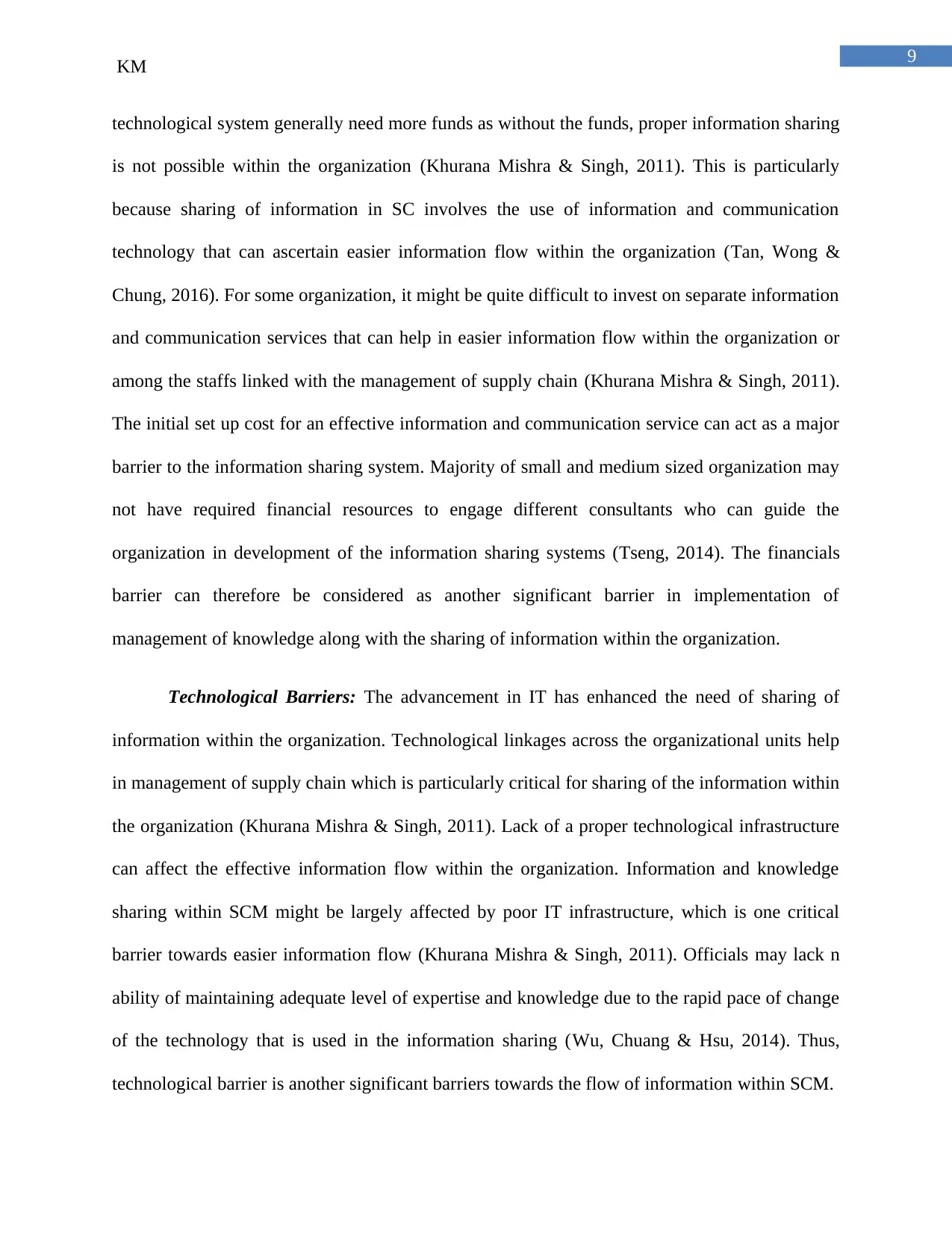
9
KM
technological system generally need more funds as without the funds, proper information sharing
is not possible within the organization (Khurana Mishra & Singh, 2011). This is particularly
because sharing of information in SC involves the use of information and communication
technology that can ascertain easier information flow within the organization (Tan, Wong &
Chung, 2016). For some organization, it might be quite difficult to invest on separate information
and communication services that can help in easier information flow within the organization or
among the staffs linked with the management of supply chain (Khurana Mishra & Singh, 2011).
The initial set up cost for an effective information and communication service can act as a major
barrier to the information sharing system. Majority of small and medium sized organization may
not have required financial resources to engage different consultants who can guide the
organization in development of the information sharing systems (Tseng, 2014). The financials
barrier can therefore be considered as another significant barrier in implementation of
management of knowledge along with the sharing of information within the organization.
Technological Barriers: The advancement in IT has enhanced the need of sharing of
information within the organization. Technological linkages across the organizational units help
in management of supply chain which is particularly critical for sharing of the information within
the organization (Khurana Mishra & Singh, 2011). Lack of a proper technological infrastructure
can affect the effective information flow within the organization. Information and knowledge
sharing within SCM might be largely affected by poor IT infrastructure, which is one critical
barrier towards easier information flow (Khurana Mishra & Singh, 2011). Officials may lack n
ability of maintaining adequate level of expertise and knowledge due to the rapid pace of change
of the technology that is used in the information sharing (Wu, Chuang & Hsu, 2014). Thus,
technological barrier is another significant barriers towards the flow of information within SCM.
KM
technological system generally need more funds as without the funds, proper information sharing
is not possible within the organization (Khurana Mishra & Singh, 2011). This is particularly
because sharing of information in SC involves the use of information and communication
technology that can ascertain easier information flow within the organization (Tan, Wong &
Chung, 2016). For some organization, it might be quite difficult to invest on separate information
and communication services that can help in easier information flow within the organization or
among the staffs linked with the management of supply chain (Khurana Mishra & Singh, 2011).
The initial set up cost for an effective information and communication service can act as a major
barrier to the information sharing system. Majority of small and medium sized organization may
not have required financial resources to engage different consultants who can guide the
organization in development of the information sharing systems (Tseng, 2014). The financials
barrier can therefore be considered as another significant barrier in implementation of
management of knowledge along with the sharing of information within the organization.
Technological Barriers: The advancement in IT has enhanced the need of sharing of
information within the organization. Technological linkages across the organizational units help
in management of supply chain which is particularly critical for sharing of the information within
the organization (Khurana Mishra & Singh, 2011). Lack of a proper technological infrastructure
can affect the effective information flow within the organization. Information and knowledge
sharing within SCM might be largely affected by poor IT infrastructure, which is one critical
barrier towards easier information flow (Khurana Mishra & Singh, 2011). Officials may lack n
ability of maintaining adequate level of expertise and knowledge due to the rapid pace of change
of the technology that is used in the information sharing (Wu, Chuang & Hsu, 2014). Thus,
technological barrier is another significant barriers towards the flow of information within SCM.
Secure Best Marks with AI Grader
Need help grading? Try our AI Grader for instant feedback on your assignments.
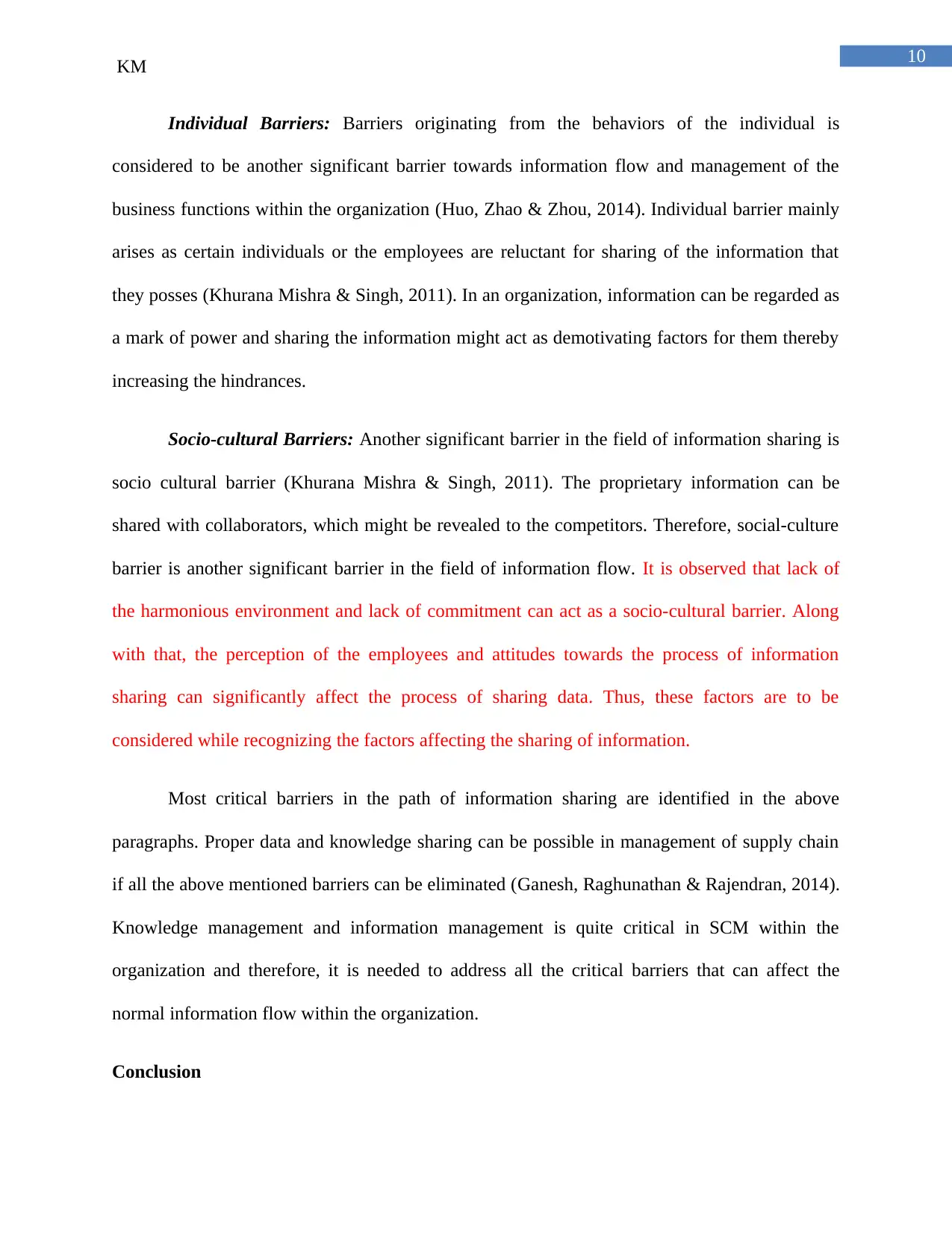
10
KM
Individual Barriers: Barriers originating from the behaviors of the individual is
considered to be another significant barrier towards information flow and management of the
business functions within the organization (Huo, Zhao & Zhou, 2014). Individual barrier mainly
arises as certain individuals or the employees are reluctant for sharing of the information that
they posses (Khurana Mishra & Singh, 2011). In an organization, information can be regarded as
a mark of power and sharing the information might act as demotivating factors for them thereby
increasing the hindrances.
Socio-cultural Barriers: Another significant barrier in the field of information sharing is
socio cultural barrier (Khurana Mishra & Singh, 2011). The proprietary information can be
shared with collaborators, which might be revealed to the competitors. Therefore, social-culture
barrier is another significant barrier in the field of information flow. It is observed that lack of
the harmonious environment and lack of commitment can act as a socio-cultural barrier. Along
with that, the perception of the employees and attitudes towards the process of information
sharing can significantly affect the process of sharing data. Thus, these factors are to be
considered while recognizing the factors affecting the sharing of information.
Most critical barriers in the path of information sharing are identified in the above
paragraphs. Proper data and knowledge sharing can be possible in management of supply chain
if all the above mentioned barriers can be eliminated (Ganesh, Raghunathan & Rajendran, 2014).
Knowledge management and information management is quite critical in SCM within the
organization and therefore, it is needed to address all the critical barriers that can affect the
normal information flow within the organization.
Conclusion
KM
Individual Barriers: Barriers originating from the behaviors of the individual is
considered to be another significant barrier towards information flow and management of the
business functions within the organization (Huo, Zhao & Zhou, 2014). Individual barrier mainly
arises as certain individuals or the employees are reluctant for sharing of the information that
they posses (Khurana Mishra & Singh, 2011). In an organization, information can be regarded as
a mark of power and sharing the information might act as demotivating factors for them thereby
increasing the hindrances.
Socio-cultural Barriers: Another significant barrier in the field of information sharing is
socio cultural barrier (Khurana Mishra & Singh, 2011). The proprietary information can be
shared with collaborators, which might be revealed to the competitors. Therefore, social-culture
barrier is another significant barrier in the field of information flow. It is observed that lack of
the harmonious environment and lack of commitment can act as a socio-cultural barrier. Along
with that, the perception of the employees and attitudes towards the process of information
sharing can significantly affect the process of sharing data. Thus, these factors are to be
considered while recognizing the factors affecting the sharing of information.
Most critical barriers in the path of information sharing are identified in the above
paragraphs. Proper data and knowledge sharing can be possible in management of supply chain
if all the above mentioned barriers can be eliminated (Ganesh, Raghunathan & Rajendran, 2014).
Knowledge management and information management is quite critical in SCM within the
organization and therefore, it is needed to address all the critical barriers that can affect the
normal information flow within the organization.
Conclusion
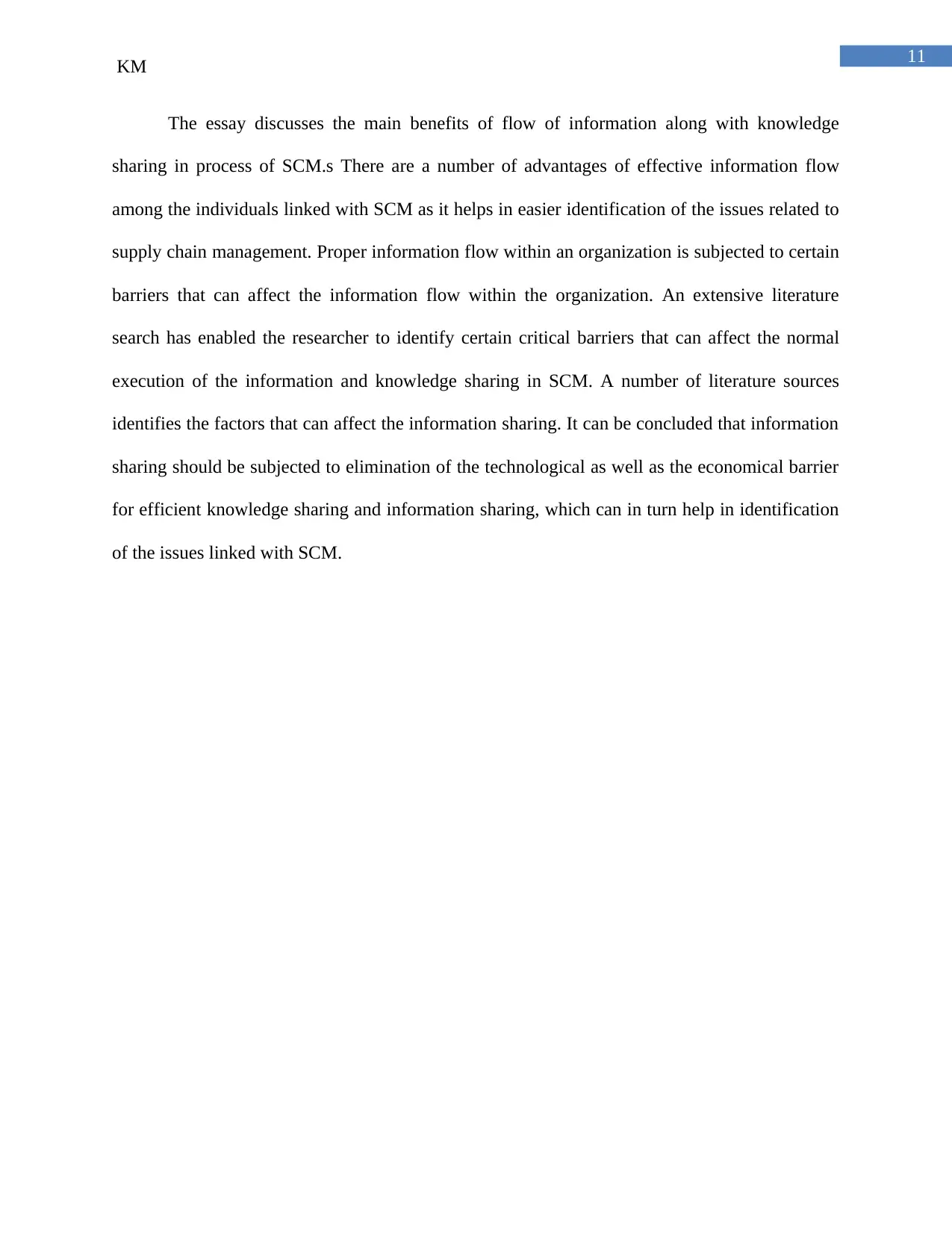
11
KM
The essay discusses the main benefits of flow of information along with knowledge
sharing in process of SCM.s There are a number of advantages of effective information flow
among the individuals linked with SCM as it helps in easier identification of the issues related to
supply chain management. Proper information flow within an organization is subjected to certain
barriers that can affect the information flow within the organization. An extensive literature
search has enabled the researcher to identify certain critical barriers that can affect the normal
execution of the information and knowledge sharing in SCM. A number of literature sources
identifies the factors that can affect the information sharing. It can be concluded that information
sharing should be subjected to elimination of the technological as well as the economical barrier
for efficient knowledge sharing and information sharing, which can in turn help in identification
of the issues linked with SCM.
KM
The essay discusses the main benefits of flow of information along with knowledge
sharing in process of SCM.s There are a number of advantages of effective information flow
among the individuals linked with SCM as it helps in easier identification of the issues related to
supply chain management. Proper information flow within an organization is subjected to certain
barriers that can affect the information flow within the organization. An extensive literature
search has enabled the researcher to identify certain critical barriers that can affect the normal
execution of the information and knowledge sharing in SCM. A number of literature sources
identifies the factors that can affect the information sharing. It can be concluded that information
sharing should be subjected to elimination of the technological as well as the economical barrier
for efficient knowledge sharing and information sharing, which can in turn help in identification
of the issues linked with SCM.
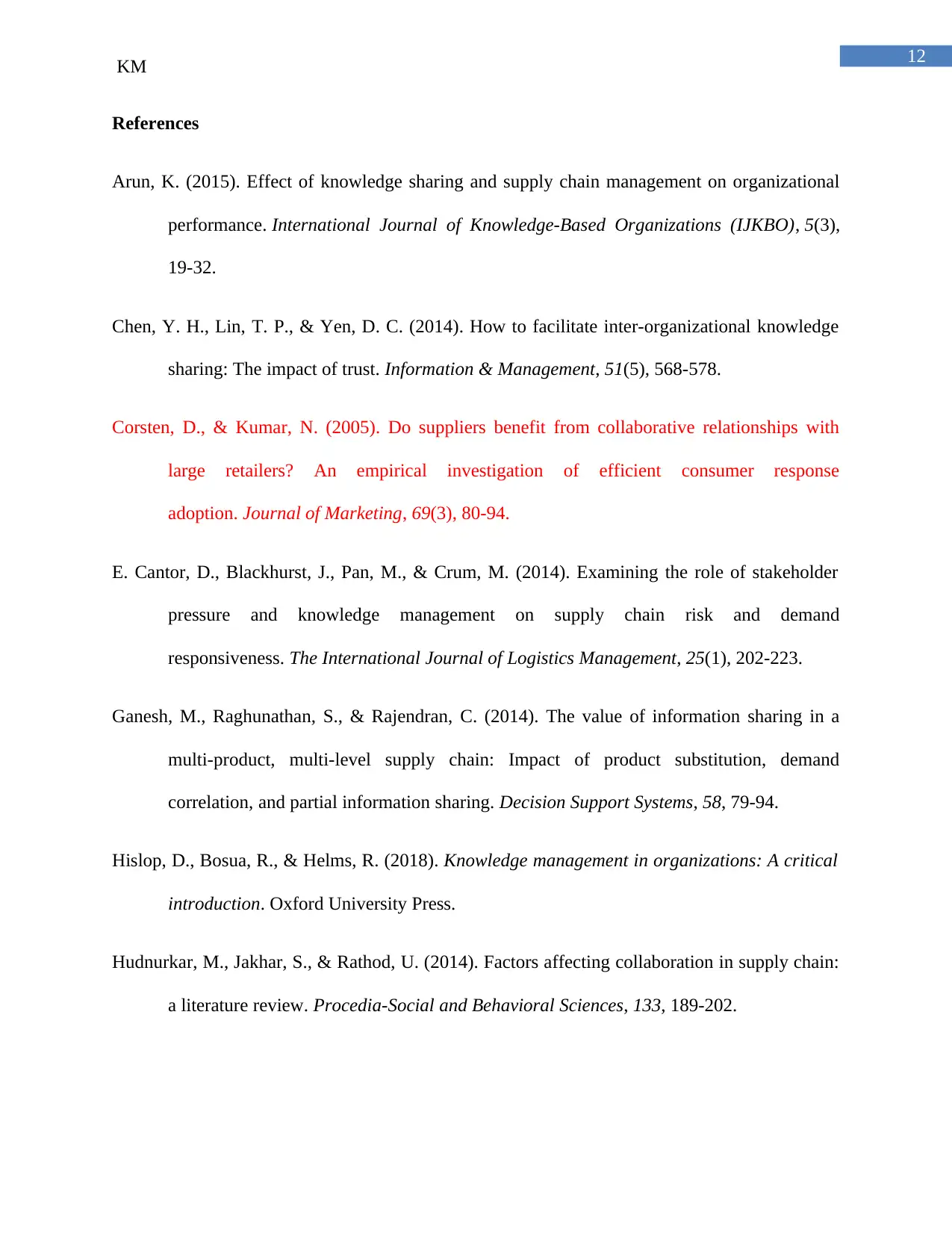
12
KM
References
Arun, K. (2015). Effect of knowledge sharing and supply chain management on organizational
performance. International Journal of Knowledge-Based Organizations (IJKBO), 5(3),
19-32.
Chen, Y. H., Lin, T. P., & Yen, D. C. (2014). How to facilitate inter-organizational knowledge
sharing: The impact of trust. Information & Management, 51(5), 568-578.
Corsten, D., & Kumar, N. (2005). Do suppliers benefit from collaborative relationships with
large retailers? An empirical investigation of efficient consumer response
adoption. Journal of Marketing, 69(3), 80-94.
E. Cantor, D., Blackhurst, J., Pan, M., & Crum, M. (2014). Examining the role of stakeholder
pressure and knowledge management on supply chain risk and demand
responsiveness. The International Journal of Logistics Management, 25(1), 202-223.
Ganesh, M., Raghunathan, S., & Rajendran, C. (2014). The value of information sharing in a
multi-product, multi-level supply chain: Impact of product substitution, demand
correlation, and partial information sharing. Decision Support Systems, 58, 79-94.
Hislop, D., Bosua, R., & Helms, R. (2018). Knowledge management in organizations: A critical
introduction. Oxford University Press.
Hudnurkar, M., Jakhar, S., & Rathod, U. (2014). Factors affecting collaboration in supply chain:
a literature review. Procedia-Social and Behavioral Sciences, 133, 189-202.
KM
References
Arun, K. (2015). Effect of knowledge sharing and supply chain management on organizational
performance. International Journal of Knowledge-Based Organizations (IJKBO), 5(3),
19-32.
Chen, Y. H., Lin, T. P., & Yen, D. C. (2014). How to facilitate inter-organizational knowledge
sharing: The impact of trust. Information & Management, 51(5), 568-578.
Corsten, D., & Kumar, N. (2005). Do suppliers benefit from collaborative relationships with
large retailers? An empirical investigation of efficient consumer response
adoption. Journal of Marketing, 69(3), 80-94.
E. Cantor, D., Blackhurst, J., Pan, M., & Crum, M. (2014). Examining the role of stakeholder
pressure and knowledge management on supply chain risk and demand
responsiveness. The International Journal of Logistics Management, 25(1), 202-223.
Ganesh, M., Raghunathan, S., & Rajendran, C. (2014). The value of information sharing in a
multi-product, multi-level supply chain: Impact of product substitution, demand
correlation, and partial information sharing. Decision Support Systems, 58, 79-94.
Hislop, D., Bosua, R., & Helms, R. (2018). Knowledge management in organizations: A critical
introduction. Oxford University Press.
Hudnurkar, M., Jakhar, S., & Rathod, U. (2014). Factors affecting collaboration in supply chain:
a literature review. Procedia-Social and Behavioral Sciences, 133, 189-202.
Paraphrase This Document
Need a fresh take? Get an instant paraphrase of this document with our AI Paraphraser
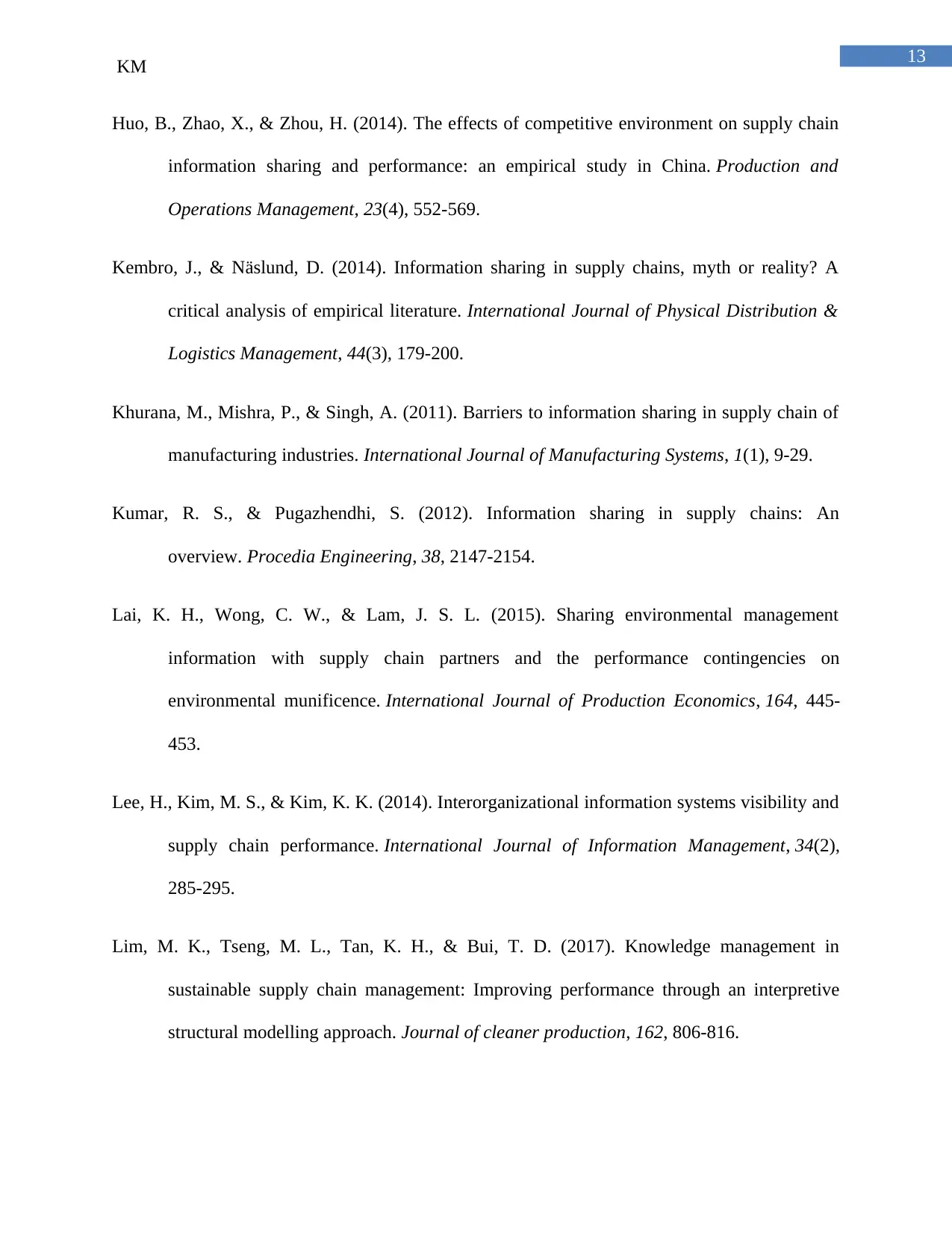
13
KM
Huo, B., Zhao, X., & Zhou, H. (2014). The effects of competitive environment on supply chain
information sharing and performance: an empirical study in China. Production and
Operations Management, 23(4), 552-569.
Kembro, J., & Näslund, D. (2014). Information sharing in supply chains, myth or reality? A
critical analysis of empirical literature. International Journal of Physical Distribution &
Logistics Management, 44(3), 179-200.
Khurana, M., Mishra, P., & Singh, A. (2011). Barriers to information sharing in supply chain of
manufacturing industries. International Journal of Manufacturing Systems, 1(1), 9-29.
Kumar, R. S., & Pugazhendhi, S. (2012). Information sharing in supply chains: An
overview. Procedia Engineering, 38, 2147-2154.
Lai, K. H., Wong, C. W., & Lam, J. S. L. (2015). Sharing environmental management
information with supply chain partners and the performance contingencies on
environmental munificence. International Journal of Production Economics, 164, 445-
453.
Lee, H., Kim, M. S., & Kim, K. K. (2014). Interorganizational information systems visibility and
supply chain performance. International Journal of Information Management, 34(2),
285-295.
Lim, M. K., Tseng, M. L., Tan, K. H., & Bui, T. D. (2017). Knowledge management in
sustainable supply chain management: Improving performance through an interpretive
structural modelling approach. Journal of cleaner production, 162, 806-816.
KM
Huo, B., Zhao, X., & Zhou, H. (2014). The effects of competitive environment on supply chain
information sharing and performance: an empirical study in China. Production and
Operations Management, 23(4), 552-569.
Kembro, J., & Näslund, D. (2014). Information sharing in supply chains, myth or reality? A
critical analysis of empirical literature. International Journal of Physical Distribution &
Logistics Management, 44(3), 179-200.
Khurana, M., Mishra, P., & Singh, A. (2011). Barriers to information sharing in supply chain of
manufacturing industries. International Journal of Manufacturing Systems, 1(1), 9-29.
Kumar, R. S., & Pugazhendhi, S. (2012). Information sharing in supply chains: An
overview. Procedia Engineering, 38, 2147-2154.
Lai, K. H., Wong, C. W., & Lam, J. S. L. (2015). Sharing environmental management
information with supply chain partners and the performance contingencies on
environmental munificence. International Journal of Production Economics, 164, 445-
453.
Lee, H., Kim, M. S., & Kim, K. K. (2014). Interorganizational information systems visibility and
supply chain performance. International Journal of Information Management, 34(2),
285-295.
Lim, M. K., Tseng, M. L., Tan, K. H., & Bui, T. D. (2017). Knowledge management in
sustainable supply chain management: Improving performance through an interpretive
structural modelling approach. Journal of cleaner production, 162, 806-816.
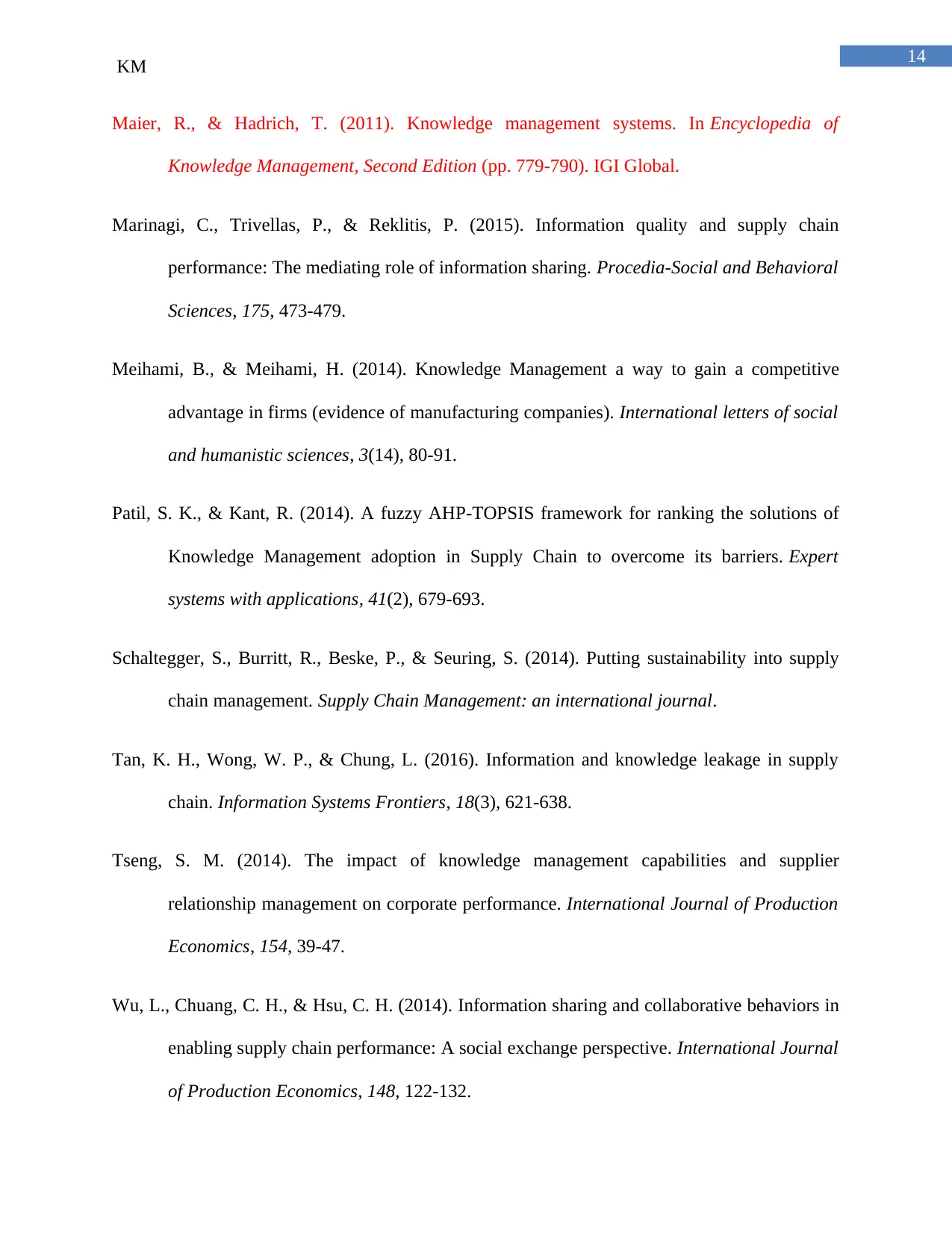
14
KM
Maier, R., & Hadrich, T. (2011). Knowledge management systems. In Encyclopedia of
Knowledge Management, Second Edition (pp. 779-790). IGI Global.
Marinagi, C., Trivellas, P., & Reklitis, P. (2015). Information quality and supply chain
performance: The mediating role of information sharing. Procedia-Social and Behavioral
Sciences, 175, 473-479.
Meihami, B., & Meihami, H. (2014). Knowledge Management a way to gain a competitive
advantage in firms (evidence of manufacturing companies). International letters of social
and humanistic sciences, 3(14), 80-91.
Patil, S. K., & Kant, R. (2014). A fuzzy AHP-TOPSIS framework for ranking the solutions of
Knowledge Management adoption in Supply Chain to overcome its barriers. Expert
systems with applications, 41(2), 679-693.
Schaltegger, S., Burritt, R., Beske, P., & Seuring, S. (2014). Putting sustainability into supply
chain management. Supply Chain Management: an international journal.
Tan, K. H., Wong, W. P., & Chung, L. (2016). Information and knowledge leakage in supply
chain. Information Systems Frontiers, 18(3), 621-638.
Tseng, S. M. (2014). The impact of knowledge management capabilities and supplier
relationship management on corporate performance. International Journal of Production
Economics, 154, 39-47.
Wu, L., Chuang, C. H., & Hsu, C. H. (2014). Information sharing and collaborative behaviors in
enabling supply chain performance: A social exchange perspective. International Journal
of Production Economics, 148, 122-132.
KM
Maier, R., & Hadrich, T. (2011). Knowledge management systems. In Encyclopedia of
Knowledge Management, Second Edition (pp. 779-790). IGI Global.
Marinagi, C., Trivellas, P., & Reklitis, P. (2015). Information quality and supply chain
performance: The mediating role of information sharing. Procedia-Social and Behavioral
Sciences, 175, 473-479.
Meihami, B., & Meihami, H. (2014). Knowledge Management a way to gain a competitive
advantage in firms (evidence of manufacturing companies). International letters of social
and humanistic sciences, 3(14), 80-91.
Patil, S. K., & Kant, R. (2014). A fuzzy AHP-TOPSIS framework for ranking the solutions of
Knowledge Management adoption in Supply Chain to overcome its barriers. Expert
systems with applications, 41(2), 679-693.
Schaltegger, S., Burritt, R., Beske, P., & Seuring, S. (2014). Putting sustainability into supply
chain management. Supply Chain Management: an international journal.
Tan, K. H., Wong, W. P., & Chung, L. (2016). Information and knowledge leakage in supply
chain. Information Systems Frontiers, 18(3), 621-638.
Tseng, S. M. (2014). The impact of knowledge management capabilities and supplier
relationship management on corporate performance. International Journal of Production
Economics, 154, 39-47.
Wu, L., Chuang, C. H., & Hsu, C. H. (2014). Information sharing and collaborative behaviors in
enabling supply chain performance: A social exchange perspective. International Journal
of Production Economics, 148, 122-132.

15
KM
KM
1 out of 16
Related Documents
Your All-in-One AI-Powered Toolkit for Academic Success.
+13062052269
info@desklib.com
Available 24*7 on WhatsApp / Email
![[object Object]](/_next/static/media/star-bottom.7253800d.svg)
Unlock your academic potential
© 2024 | Zucol Services PVT LTD | All rights reserved.





